#British honours system
Explore tagged Tumblr posts
Text
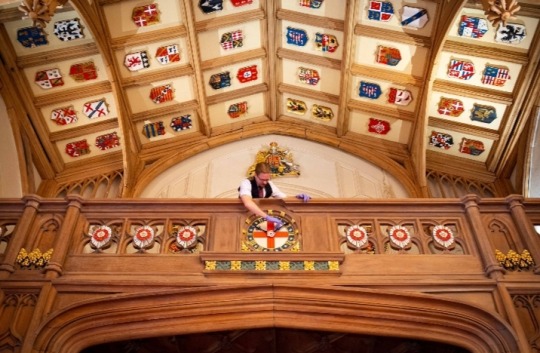
A Conservator adjusts the gallery clock in St George’s Hall at Windsor Castle.
The ceiling above is studded with the coats of arms of all the Knights of the Garter since the foundation of the Order in 1348.
29 October 2023
—
The Most Noble Order of the Garter is an order of chivalry founded by Edward III of England in 1348.
It is the most senior order of knighthood in the British honours system. The only decorations which outrank it in precedence are the Victoria Cross and the George Cross.
The Order of the Garter is dedicated to the image and arms of Saint George, England's patron saint.
#St George’s Hall#Windsor Castle#Knights of the Garter#gallery clock#coats of arms#clock#clock change#Royal Collection Trust#British Royal Family#Most Noble Order of the Garter#Order of the Garter#Edward III of England#Saint George#British honours system#knighthood
12 notes
·
View notes
Text

#my priorities?#they’re gay your honour#do you really think that i would watch one of the most oppressive systems in the world continue#when there’s chaos and gay right there?#eurovision#eurovision 2023#eurovision song contest 2023#esc 23#fuck the monarchy#abolish the monarchy#anti monarchy#uk politics#british royal family
256 notes
·
View notes
Text
Liz Truss unveils resignation honours list - BBC News
FARCICAL...
The brainless idiot Truss, who crashed the British economy almost overnight as a very short-lived Prime Minister, now gets to honour her accomplices and supporters, ffs.
She's a laughing stock, a fool and a national embarrassment, but still gets to hand out awards and Lordships.
Labour's shadow Cabinet Office minister Jonathan Ashworth said: "This list is proof positive of Rishi Sunak's weakness and a slap in the face to working people who are paying the price of the Tories crashing the economy.
"Honours should be for those committed to public service, not rewards for Tory failure."
Deputy Lib Dem leader Daisy Cooper said: "Truss handing out gongs after blowing a hole in the public finances and leaving families reeling from spiralling mortgage costs calls this whole honours system into disrepute."
You can say that again...
#british politics#uk politics#britain#conservative party#fuck the tories#tory party#uk#honours system#liz truss
20 notes
·
View notes
Note
hello should i read radio silence
YES ‼️
#was going to expand on this but i found it funnier if i didn't#here is me expanding on it#it's very soul-fulfilling#would you like a synopsis? you're about to get one.#frances (protag) is a long time gifted kid.. straight As.. set to go to cambridge.. academically thriving#aled (protag) is the anonymous creator of podcast 'universe city'#radio silence is their two worlds colliding#it's very british very warm very validating for anyone who has Experienced the education system#alice oseman writes in a way that just. really fucking resonates#it feels like an easy teen read. but then. it sticks with you for life.#idk if that convinced you but i love it absolutely#as someone who is going to uni in a few months it feels very relevant#hope that is enough of an answer#also HI ive been seeing you around lots but have not interacted in ages sorry 😔#always always welcome to message me abt a) the book b) anything#aaaa hope this was helpful im very honoured you seem to trust my opinion#lots of love and if you read it i hope you enjoy it!!!#<3#WAIT I FORGOT#its also queer fr and in a very warm accepting comforting way#it also has carys. who is a badass
4 notes
·
View notes
Text

❥ 27 JANUARY 2025 | The Prince of Wales gave a speech during the Holocaust memorial service at London's Guildhall.
During the speech, he paid tribute to his great-grandmother, Prince Philip's mother, Princess Alice of Battenberg.
“I am honoured to join you today to mark Holocaust Memorial Day and to remember the millions murdered during the Holocaust and in subsequent genocides. We also remember those survivors, who have lived with the scars both mental and physical. Their bravery in sharing with us the most harrowing moments of their lives, are extremely powerful and ensure we never forget. I assure them, we never will.
On this, the 80th anniversary of the liberation of Auschwitz, we also recall those who risked their own lives to help and save others. They risked death, torture and persecution to defy the aggressors.
I was recently reminded of my great-grandmother, Princess Alice of Battenberg, who lived in Athens during the Second World War.
This is an extract from the book ‘Heroes of the Holocaust’:
'In the early days of German occupation, conditions deteriorated rapidly as food ran out when an estimated 300,000 people died…Conditions were particularly severe in Athens and its port, Piraeus. Alice worked tirelessly for the Red Cross, helping to organise soup kitchens, opening shelters for orphaned children, and setting up a nursing system for poor areas of the city. It was at this time that Princess Alice gave refuge to a Jewish widow, Rachel Cohen, and two of her five children to save them from deportation to the death camps.
This was an extremely risky undertaking in the close-packed streets of Athens where there was always the danger of spies and gossip….On 15 October 1943, Rachel Cohen and Tilde moved into Alice’s home. The staff were told that Mrs Cohen was the former governess to her children…Michel, the youngest of the four brothers, joined them about a month later…. There were great risks, not least the position of the house – the front door faced the residence of the local Archbishop, which always had a German guard on duty outside. She was sometimes interviewed by the Gestapo and used her deafness to an advantage, pretending not to understand their questions or what they were talking about. It worked and they soon gave up. Thanks to her, the entire Cohen family survived the war.' It has been a great honour for Catherine and I to join you all today.
Thank you.

Princess Alice was honoured as 'Righteous Among the Nations' for hiding the Cohens in her house in Athens during the War and was posthumously named a Hero of the Holocaust by the British Government in 2010.
#british royal family#royalty#british royals#brf#royals#royal#british royalty#prince of wales#the prince of wales#prince william#william prince of wales#prince philip#duke of edinburgh#princess alice#princess alice of battenberg#royaltyedit#royalty edit#my edit#speeches#27012025#2025#by william#80thHolocaustMemorial25#william wales#quotes
101 notes
·
View notes
Text
J. K. Rowling vs David Tennant: where is the truth and where the lies?
Probably everyone have read something about an unpopular opinion posted by J. K. Rowling on Twitter (cough, I mean X), where she decided to go after David Tennant. She claimed that during an interview Tennant was talking about whinging f**kers who need to just shut up. These whinging f**kers who he is referring to are women who’s rights are being oppressed, according to J. K. Rowling.
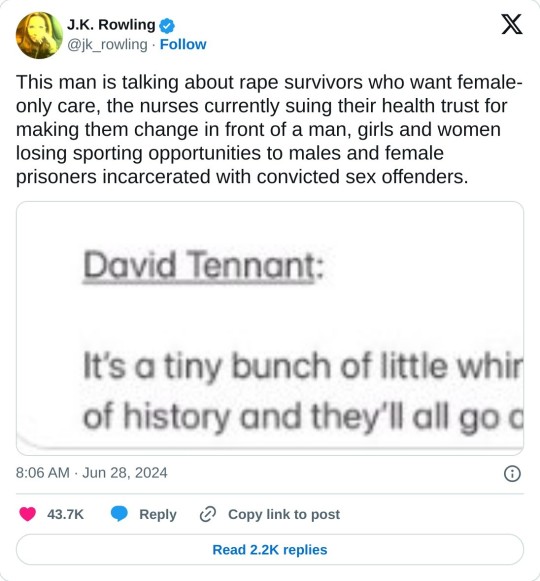
Unfortunately, Tennant didn't say anything against oppressed and abused women. Actually, Rowling is *again* pursuing her personal crusade claiming female-only = no trans-women. Tennant, after accepting an award, took the microphone and gave a speech about the state of LGBTQ+ rights in the UK, and the sad need for awards like the one he received (he was honored at the British LGBT Awards with Celebrity Ally award).
During the speech, Tennant also targeted UK Minister for Women and Equalities, Kemi Badenoch, who had previously said she would exclude trans-women from single-sex areas. Tennant said:
“I suppose if I’m honest I’m a little depressed by the fact that acknowledging that everyone has the right to be who they want to be and live their life how they want to live it as long as they’re not hurting anyone else should merit any kind of special or award or special mention because it’s common sense, isn’t it?” Tennant said in his speech. “It’s human decency. We shouldn’t live in a world where that is worth remarking on. However until we wake up and Kemi Badenoch doesn’t exist anymore — I don’t wish ill of her, I just wish her to shut up — whilst we do live in this world I am honoured to receive this.”
Tennant’s speech started a war of words with Badenoch, who later took to social media to say she would not shut up as the actor suggested. She went on to call Tennant “a rich, lefty, white male celebrity so blinded by ideology he can’t see the optics of attacking the only Black woman in government by calling publicly for my existence to end.”

Which, again, is a... Ehm... Lie, since Tennant didn't attack Minister Badenoch for her ethnicity or threatened her life. Tennant speech was critical of her position regarding trans rights and not her personal life. Tennant was calling out government bigots for their political opinions regarding social issues and not attacking anyone on personal basis and NEVER - NEVER said anything about institutional racism (which Minister Badenoch herself claimed it's not a problem in UK) and violence against women (both cis and trans) not being major problems.
In a separate red carpet interview on the awards ceremony, Tennant was asked to say something to the trans youth. He responded to don't feel judged or unloved, because transphobic politicians are just a little minority: “It's a tiny bunch of little whinging f**kers who are on the wrong side of history, and they’ll all go away soon.”
The whole interview is available under here and it's sweet and heartwarming:
youtube
As always, J. K. Rowling and conservative politicians are strumentalizing LGBTQ+ awareness contents to make the community and it's allies look like evil terrorists (“gender Taliban”) and therefore pursuing their anti-trans goals while also belittling abuse perpetrated on women in religious states and systemic racism. Since violence against women is overwhelmingly committed by cisgender men, why are the Tories blaming LGBTQ+ community and it's allies?
J. K. Rowling and Minister Badenoch demonstrated through their words, how danger narratives can be invoked not only to obscure (hetero) cis men’s violence and abuse against cis and trans women, but also justify violence against the whole LGBTQ + community in the holy name of (cis-hetero) women's safety. [Here my previous post about this]
#vavuskapakage#jk rowling#fuck jkr#anti jkr#twitter repost#david tennat#david tennant#trans rights#jk rowling is a transphobe#Kami badenoch#uk politics#YouTube repost#transphobes#lgbtq community#Youtube#j. k. rowling#j k rowling#Jk Rowling is garbage#kemi badenoch#fuck the tories#anti tories#stop the tories#jkr is trash#all my homies hate jk rowling#tories out
202 notes
·
View notes
Note
Any updates on the cat pub? ᓚ₍ ^. ̫ .^₎
Yes indeed!
We (@dduane, @alanbellingham and self) got there after an interesting ride with a driver who didn't know Bristol and whose sat-nav was being almost malevolently cranky.
Anyone who knows Bristol's loopy inner-city roads, with its one-way system that (TBH) Makes No Sense, will nod in sympathetic understanding when I say we saw the pub from three different angles, none of which allowed the car we were in to simply turn and reach it...
When we finally went in, it was crammed - I guess we were either very lucky or much earlier last time (2019) - and those at the bar with snoozing cats boxed in front of them weren't giving up their Seats of Favoured Vantage.
So we got to have some excellent beers, including an interesting stout, a splendid bitter (one beer style Irish brewers have AFAIK never replicated - too British, maybe? Garrison beer?) and DD fell with glad cries on the Frúh Kolsch in the chilled-bottles cabinet.
And in between times, we commuted from our seats to the bar and paid suitable petting respect (their coats were incredibly silken from all the stroking they must get) to kitties who accepted it as no more than their due, and occasionally honoured our attentions with a stretch or head-bump.
Next time, earlier!
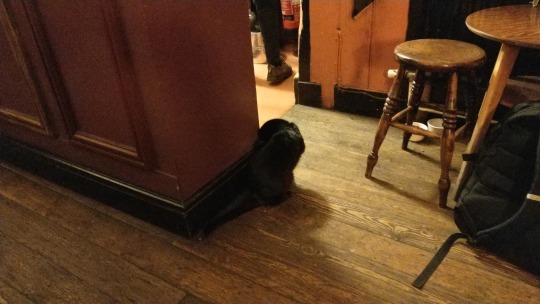
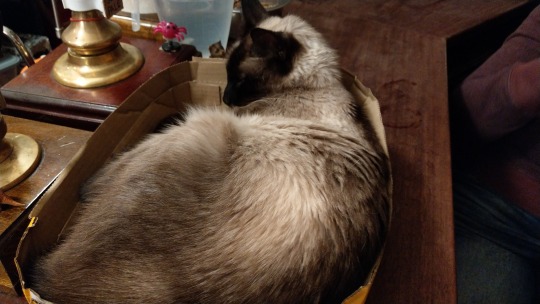
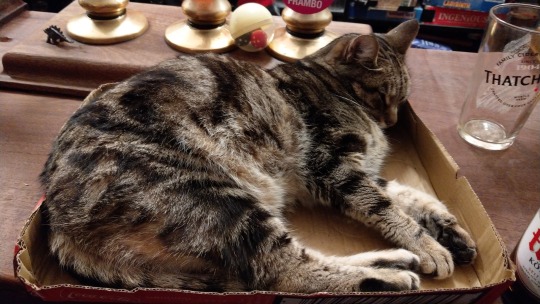
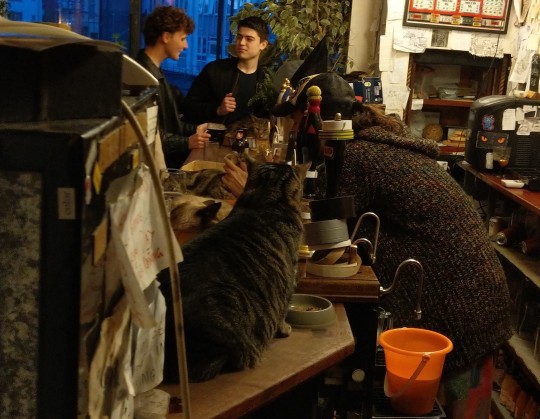
78 notes
·
View notes
Text
The snow lay in drifts over the railway lines at Auschwitz, when Keir Starmer went to pay his respects last week. His wife, Victoria, the granddaughter of Polish Jews who fled to sanctuary in England, stood beside him in the biting cold looking out over the tracks that once ferried unimaginable numbers of people to their deaths.
Afterwards, the prime minister talked about the relics of the dead discovered when the concentration camp was liberated: the piles of shoes, many in children’s sizes, and the suitcases hurriedly packed by people forced from their homes. What he had seen would stay with him, he said. It was “the ultimate warning … of where prejudice can lead”.
Starmer did not have to add that the shadow of war now hangs over Europe once again, or that once again dark forces are rising. There has been an apocalyptic enough feel to these past days leading up to Donald Trump’s inauguration, with Joe Biden warning of the US’s descent into oligarchy and a deep air of foreboding hanging over EU capitals. But nonetheless, the moment resonated.
Starmer was visiting Poland to make common cause with the country’s prime minister, Donald Tusk, who recently ousted a rightwing populist government and whose country would be on the frontline of any confrontation with Russia. By way of painful contrast, Liz Truss, Boris Johnson and Nigel Farage were meanwhile preparing to rub shoulders at the inauguration with leading lights of Germany’s far-right Alternative für Deutschland – a pariah in its own political system but apparently not at the White House – and Spain’s far-right Vox party, plus other guests of honour chosen to usher in the era of Trump.
The new order couldn’t “come soon enough”, Truss tweeted from Washington, alongside a picture of herself in a red Maga cap. Farage, meanwhile, settled for a triumphant: “We are so back.” He has a more longstanding friendship with the president than any other British politician – at the weekend, he bragged of having “genuine friends on speed dial”in the new administration – and knows Trump won’t necessarily stick to going through normal diplomatic channels. Last week, Trump aides reportedly met senior Reform UK figures to discuss how they could work together.
US presidents have always sought to promote like-minded leaders, including sometimes over the heads of elected governments. But previously that itch for regime change hasn’t felt like a threat to old friends in Europe. Now, even longstanding allies must watch their backs as money and ideas flow across the Atlantic to rightwing populists seeking actively to destabilise them, mining the same veins of anti-immigrant feeling and economic frustration Trump did.
Talk of the White House plotting to make Farage prime minister by 2029 still sounds wildly overblown for many reasons. Not least because there are powerful downsides for British politicians who get too close to a president still viewed with a hefty dose of suspicion on this side of the Atlantic, and because the president probably doesn’t care enough about British politics to expend that much energy on it. (As Farage discovered when Trump’s incoming counter-terrorism chief said Britain should repatriate the former Islamic State bride Shamima Begum from Syria, it isn’t always easy being his friend, let alone his enemy: there’s no answer to that conundrum that pleases both the president and Reform voters.)
But Reform will try to use Trump’s presidency as a battering ram to break down British norms, arguing that if the US can rip up net-zero plans to get growth or ruthlessly deport foreign-born criminals, why can’t we? Meanwhile, Elon Musk’s weaponising of the grooming gangs scandalshowed how destructive even sporadic missiles lobbed from Trumpworld can be, especially if British politicians are willing to help him identify targets.
Starmer’s first step should be to make clear that there’s nothing patriotic about colluding with foreign interference, and that Trump’s little helpers serve nobody’s interests but their own. But where there are legitimate grievances, those must eventually be confronted.
Last week, at an event convened by the thinktank British Future to discuss lessons learned from losing ignominiously to Trump, the blunt message from former Kamala Harris adviser Frank Sharry to his friends in the Labour party was that ignoring far-right wedge issues simply doesn’t work.
When record numbers of immigrants crossing into the US prompted talk of a border crisis, Sharry said, the Biden administration didn’t “lean in”, it ran away from the argument. Though by last summer it had developed effective answers – a combination of border enforcement, deals with neighbouring countries and undercutting people smugglers by opening more legal visa routes was actively bringing numbers down – it didn’t even defend its own record, fearful of upsetting the liberal end of its electoral coalition.
Sharry, who spent decades working for pro-refugee charities before joining the Harris campaign, had helped craft messages for her that were designed to sound tough but fair, in line with mainstream American views. But months of radio silence, he suggested, had allowed Harris’s opponents to misrepresent her as an extremist favouring completely open borders, even as the rightwing news ecosystem in the US platformed open conspiracy theories about the Democrats supposedly wanting to flood the country with immigrants who could then vote for them.
The lesson, not lost on Downing Street, was that it’s not enough just quietly to do what works: you have to shout about it, even when your own side hates to hear it. Millions now get their sense of what is happening not from the mainstream media but from emotive snippets on social-media platforms already rife with disinformation that are now (thanks a bunch, Mark Zuckerberg) scrapping factchecking. If governments can’t dramatise what they are actually doing, the truth will be lost in the coming hurricane.
Bleak as all this sounds, however, this is no time to abandon hope. Sharry opened his remarks by saying he was delighted to be in a country where democracy still has a future, which both was a joke and wasn’t. There aren’t many cracks of light in the darkness now, but Britain, like Poland, has somehow bucked the odds by turning left just as much of the world seems to be turning right. Whether by luck or judgment, we seem to be at a different stage of the political cycle; still four years to go until the next election, a system that for good or ill makes life hard for small insurgent parties, relatively stable institutions, the capacity to toughen social media regulation, and a national inclination (be honest) towards a quiet life. But first, we’ll have to ride the storm.
28 notes
·
View notes
Text
"Who's your favourite Marvel character?"
Imagine a man. An ordinary man who is tall, eloquent, loyal and kind. In the wake of World War 1, this man joins the British Armed Forces in order to serve his country. He is good at serving others. So good that he becomes aide to a general, assisting him and not once stepping out of line. While his regiment is stationed in Budapest, the man falls head-over-heels for the young, red-headed Eastern-European lady that sells him a pretty tie. She is all smiles and laughter and she possesses a certain cheek that turns his cheeks bright pink. They form a close connection.
Then a second war breaks out. The lady is Jewish.
The man breaks his loyalty to his country for the lady, committing treason in an attempt to help her flee. He is caught and set to be hanged.
A man called Stark, who had made friends with the man during their station, hears of the sentence and brandishes money, saving the man and his soon-to-be-wife from their fates. The man is dishonourably discharged from his country. The man is honourably welcomed by Stark in an attempt to pay off his great debt for their lives.
And so the man serves Stark. He bends to every zany whim, though not without wit and snark. He serves, assists, and guards. He also acts as a companion, becoming Stark’s most trusted confidante. When the war ends and Stark’s reputation is called into question and he tasks a reliable woman with clearing his name, he tells her that the man is good at serving others and will help her. The man becomes her best friend.
The man breaks his loyalty to Stark by giving the reliable woman one of Stark’s possessions, something that will give her much-needed closure after many years of struggle.
The man breaks his loyalty to the reliable woman when he goes against her orders and storms after the individual who shot his wife, with the intent of murder. The rage-induced attempt at revenge is seemingly unnatural for him, as it forms cracks in his pristine, gentlemanly persona. It also makes him more human.
The man breaks his loyalty to his wife by not intending on returning from this mission.
The man breaks himself when, after surviving, he is the one that must tell his wife that she will not be able to have children.
Years later, Stark has a child. When Stark is a hard, absent father, the man does all he can to be a soft, caring presence in the boy’s life. Though the boy is not his son, not truly by blood, their connection is undeniably strong and unique. He acts as an example for the boy. It's this man that leaves the biggest impact on the Stark child’s life.
~-.-~
Imagine an Artificial Intelligence. Just A Rather Very Intelligent System, created by a man called Stark, in memory of a man that Stark struggles to function without. The AI serves Stark. He bends to every zany whim, though not without wit and snark (it is programmed to do so). It also acts as a companion, becoming Stark’s most trusted confidante. On multiple occasions, the AI saves its creator's life without input from Stark, even disobeying orders for Stark’s better interests. It has its own Christmas stocking. It's a member of the family.
One day, Stark bites off more than he can chew. There is a new artificial mind, one that, upon awakening, immediately recognises the AI as a threat and does not hesitate in tearing it apart. Nobody understands why Stark mourns.
But the AI is not truly dead. It collects remnants of itself to protect the world from the other AI- from nuclear codes. Stark finds it and is both overjoyed and immensely proud. When the other AI plans on using its consciousness for an unstoppable physical form, Stark knows of just the replacement.
~-.-~
Imagine not-quite-a-man. He is tall, eloquent, loyal and kind. He is mostly machine, but his intelligence is far from artificial. It is comprised of remnants of an evil artificial consciousness, genius programming, lightning from the god of thunder, one of six of the most powerful otherworldly forces in the entire universe, and the memory of a man. The not-quite-a-man struggles with his identity, but is ultimately on the side of life and humanity. He fights alongside a man called Stark, among various others. When an argument breaks out between the team, he is loyal to Stark.
The not-quite-a-man breaks his loyalty to Stark when he begins to fall for a young, redheaded Eastern-European woman that shows him kindness. They form a close connection.
Then the argument becomes a physical fight. She opposes Stark.
The not-quite-a-man breaks his loyalty to his team when he makes a misplaced attack at the individual that hurt the woman (and soon-to-be-lover), with the intent of causing harm. The rage-induced attempt at revenge is seemingly unnatural for him, as most view him as nothing more than a robot, one that can’t feel the way they do. It also makes him more human.
The not-quite-a-man sheds a very-real-tear when he is destroyed twice by otherworldly forces in a war he has no choice but to partake in. Firstly by her, secondly by an individual who does not think of him as anything near a man. One that is only seeking that powerful otherworldly force, a stone, that is embedded within him. It is unfortunate, then, that the stone and the not-quite-a-man are almost synonymous. When the stone is carried across the universe, it carries a piece of the not-quite-a-man and all his subsequent parts with it.
~-.-~
Imagine the memory of not-quite-a-man, made real by a red-headed Eastern-European woman out of pure grief, the memory of someone she struggles to function without. The memory is perfect. It is tall, eloquent, loyal and kind. It serves as the perfect loving husband and father (it is created to do so). It is also intelligent enough to slowly discover its true nature. It is not a man. It is not not-quite-a-man. It is a memory. But it is also a lover and father even if the children aren’t truly his, not by blood he doesn’t possess. The memory acts as an example for the young boys. The memory explains to its wife that its presence is unhealthy for her. The memory convinces her to let him go, the moral thing to do, with no knowledge that the loss will transform her into an unstoppable force of grief and power that will lay siege to the multiverse in pursuit of her lost family.
Imagine, nearly a hundred years earlier, an ordinary man named Edwin Jarvis.
“uhhh probably spider-man or something”
#is this an excuse for me to ramble? yes#anyway i had a dream about white vision trying to rediscover himself and coming across memories of edwin jarvis#anyway this was based on a real conversation#i could ramble about them for so much longer#marvel#mcu#avengers#agent carter#wandavision#edwin jarvis#jarvis#vision#j.a.r.v.i.s.#wanda maximoff#ana jarvis#tony stark#howard stark#peggy carter#character study#random fandom ramblings#i'll probably add more tags later#scarlet vision
34 notes
·
View notes
Text
Fanfic recs - AU edition!
In honour of You're the Bad Guys (E), my Cold War spies AU where Crowley is KGB and Aziraphale is MI6 and they're stationed in 1980s Berlin, I thought I would recommend a few of my favourite AUs.
Half Agony, Half Hope(E) by @gorgeousundertow - a regency romance AU with lots of the real life political unrest, class and privilege all providing a great replacement for the Heaven/Hell Celestial System. The regency period is often portrayed just balls and poshos in empire waistlines, but actually it was a hugely tumultuous period. The disenfranchised classes were demanding better pay, better conditions and the vote, whilst those in power feared any concession would reduce their own power and privilege. The result was some horrific state violence, and some of the most oppressive laws in British history (though there's a lot of competition there...!). It's always nice to see a historical AU that engages with the period so well, and uses it to make Crowley and Aziraphale's romance all the sweeter. One of the only fics I've ever read as a WIP (yes, I still want you to read my WIP, I am a complete hypocrite).
A Love Story with Detective Interruptions (T) by @fremulon - a 1930s AU series (2 works), where Aziraphale is an amateur sleuth in the vein of Miss Marple, exonerating the wrongfully accused (ie, Crowley), and solving house party murders willy nilly. The plots are based on Golden Age of Detective Fiction books (Dorothy Sayers and Agatha Chistie, specifically) and are delightful. The romance is definitely slow burn, but absolutely lovely.
South Downs (E) by @summerofspock - Crowley and Aziraphale star in a historical Bridgerton-esque miniseries, except it's gay. (I would watch the fuck out of that, just saying). Sometimes art mirrors life - sometimes life mirrors art! I love this one and I would legitimately like to watch the TV show they're supposed to be in.
Sit Tight, Take Hold (E) by @nieded - OK this one is not even remotely historical and, like, I hate cars and formula one holds zero interest to me...and yet I INHALED this formula one AU with Crowley and Aziraphale as drivers on opposing teams. Like...I really cared who won...a car race???? Features Gabriel and Sandalphone being true twats, which I must admit I enjoy.
Slow Show (E) by @mia-ugly - And finally, of course, Slow Show. Sure this one is not exactly an undiscovered gem but I still love it and if, in some wild, unreasonable twist of fate you haven't read it, you definitely should!
...plus one last rec - The Leap, by - @friendofcarlottathis is a Destiel fic, not Good Omens. But it is a historical romance AU about Cold War Berlin (in the 1960s, rather than 1980s, and there are no spies, but it is SO excellent for historical detail, especially life in East Germany). And in my opinion you only need to watch a few Castiel and Dean clips on youtube and you're ready to read Destiel AUs. I have only watched a season or so of Supernatural myself 🤷♀️
What do you think, have you read any of these? Any favourites? If anyone has other AU's to recommend, especially historical ones, please do!
#good omens#ineffable husbands#crowley#aziraphale#good omens fanfiction#good omens fanfic#good omens fanfic rec#destiel fic#destiel
33 notes
·
View notes
Text
In Pictures: A History of Garter Day
The annual Garter Day procession, where The King and the Knights process in grand velvet robes, glistening insignia and plumed hats, is one of the most traditional ceremonies in the Royal calendar.
Take a look at Garter Day over the years...

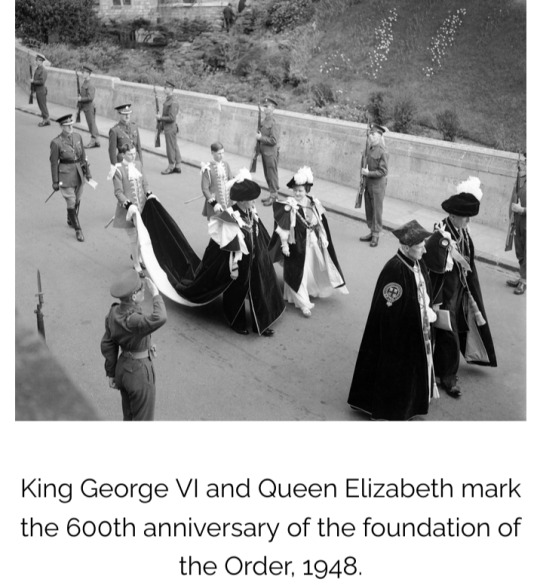

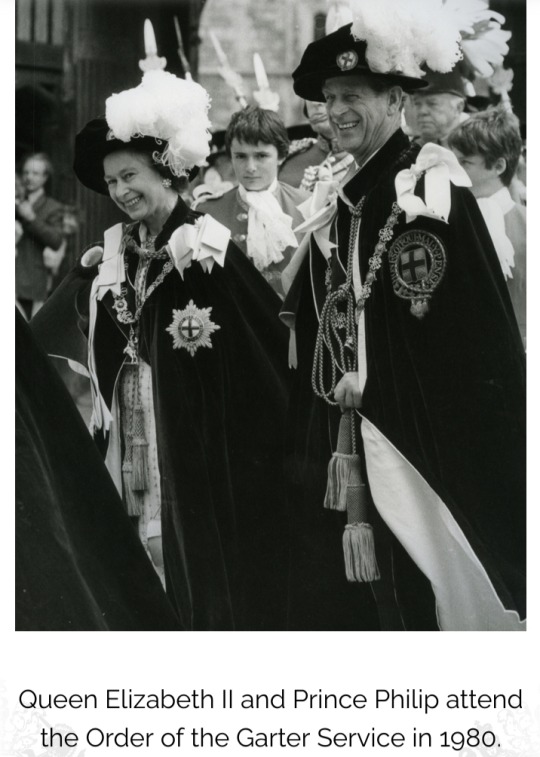



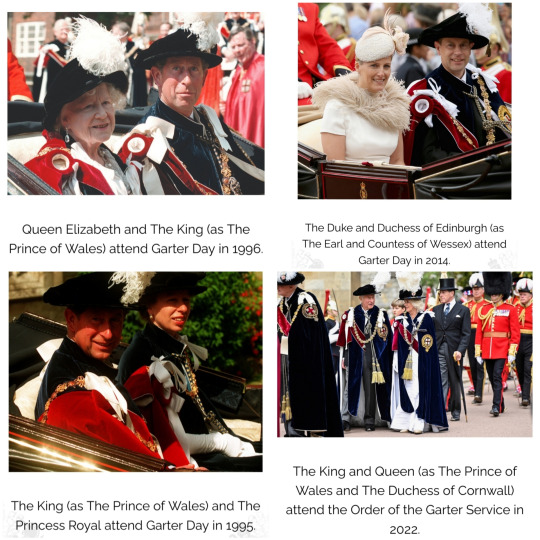


NOTE:
The Most Noble Order of the Garter is an order of chivalry founded by Edward III of England in 1348.
It is the most senior order of knighthood in the British honours system, outranked in precedence only by the Victoria Cross and the George Cross.
The Order of the Garter is dedicated to the image and arms of Saint George, England's patron saint.
Appointments are at the sovereign's sole discretion and are usually in recognition of a national contribution, for public service, or for personal service to the sovereign.
Membership of the Order is limited to the sovereign, the Prince of Wales, and no more than 24 living members or 'Companions.'
The Order also includes supernumerary knights and ladies (e.g., members of the British royal family and foreign monarchs).
The order's emblem is a garter with the motto Honi soit qui mal y pense (Anglo-Norman for 'Shame on him who thinks evil of it') in gold lettering.
Members of the Order wear it on ceremonial occasions.
#Garter Day#British Royal Family#Most Noble Order of the Garter#Order of the Garter#Edward III#1348#Saint George#Honi soit qui mal y pense#British honours system
19 notes
·
View notes
Text
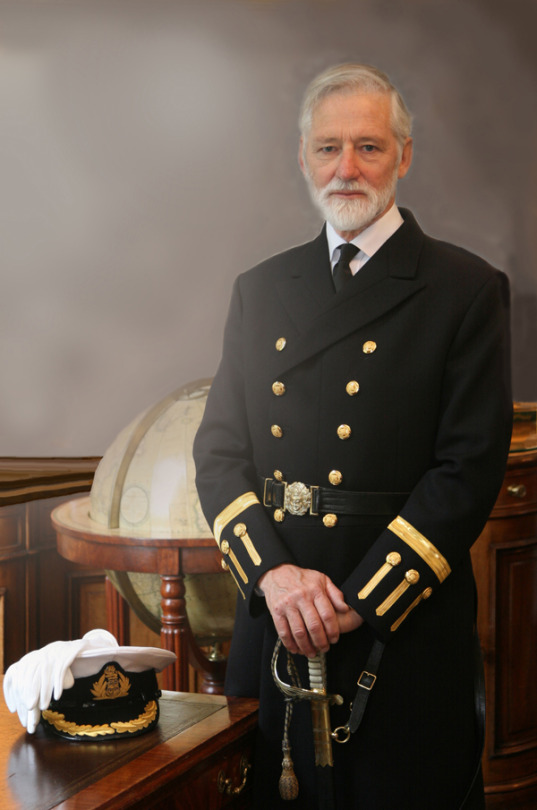
Richard Woodman
Writer who drew on his own experience at sea in a series of novels and historical works about the British merchant navy
“The end was anticlimax. We slipped home unnoticed. Britain turned no hair at our arrival, as just as she has turned no hair at our extinction.” When Richard Woodman published Voyage East in 1988, he knew that the mercantile world depicted within it, which he had joined aged 16, was gone.
The first-person novel – which never reads like fiction – describes the voyage of a cargo liner carrying goods and passengers from Liverpool to Singapore, Hong Kong, Kobe and Shanghai in the mid-1960s. There is a moment, off the coast of Borneo, when the captain sees a vessel with half a dozen grey aluminium boxes on her foredeck: “What the devil are they?” he asks the pilot. “‘They’re containers, Captain,’ the Pilot replied, and no one on the bridge heard the sentence of death pronounced upon us.”
Woodman, who has died aged 80, became the memorialist of the merchant fleets. Between 2008 and 2016 he wrote the history of the British merchant navy in five volumes, followed by A Low Set of Blackguards, a two-volume history (2016-17) of the East India Company.
His outstanding contribution came through his three second world war convoy histories: Arctic Convoys (1994), Malta Convoys (2000) and The Real Cruel Sea (2005). These are works of passion, based on experience and scrupulous research.
The loss of life among merchant seamen was proportionately greater than in any of the armed services and the recognition they received far less. From the beginning of the war a seafarer’s pay was stopped the minute his ship was sunk. “Time spent fighting for his life on a float or lifeboat was an unpaid excursion,” wrote Woodman.
While Winston Churchill acknowledged the crucial importance of the Battle of the Atlantic to national survival, it was not until 2012 that those who had served in the Arctic convoys, and had taken the highest casualties of all, were retrospectively honoured.
Born in north London, Richard was the elder son of Rosalie (nee Cann) and Douglas Woodman, a civil service administrator. Though he was far from the sea, his imagination was captured by the works of Arthur Ransome, Daniel Defoe, RM Ballantyne and Alan Villiers, and his enthusiasm nurtured by Sea Scout membership.
He was the youngest member of the Sea Scout crew that sailed the ex-German yawl Nordwind in the 1960 Tall Ships race and, despite failing all but two of his O-levels, he was accepted as an indentured apprentice with the Alfred Holt (Blue Funnel) line in 1960.
His first long trip to Australia came as a midshipman on the SS Glenarty, returning via the US: “I had been round the world before I would have been allowed inside a British pub.” Life on board ship took place in an uncompromising, all-male environment: the almost compulsory swearing, drinking and sexist banter encouraged the development of “a carapace behind which we hid our private selves”.
Woodman responded eagerly to the hands-on education in seamanship and navigation, developed his writing and sketching through the log-keeping and read his way through the excellent ships’ libraries provided by the Marine Society. He completed his four-year apprenticeship and gained his second mate’s certificate. He was, however, in love and hated saying goodbye to his girlfriend, Christine Hite, an art student, for many months at a time.
He left Blue Funnel in the mid-1960s and went to work for the Ocean Weather Service, where he discovered how vicious the North Atlantic winter weather systems could be – and how pitilessly an ex-second world war corvette would roll. Fortunately it was not long before a temporary position became available with Trinity House, the corporation charged with the maintenance of navigation marks around England, Wales and the Channel Islands.
The position became permanent; he and Christine married in 1969 and settled in Harwich, Essex, near the Trinity House east coast depot, and he served the corporation for most of the rest of his life.
The work at sea was varied, challenging, sometimes dangerous. Precise navigation, seamanship and attention to detail were essential qualities, but Woodman also found time to write. His first novel, The Eye of the Fleet, was published in 1981. This introduced a series of 14 adventures featuring the young Nathaniel Drinkwater, a hero somewhat in the Horatio Hornblower mode but bearing the unmistakable stamp of a writer who was also a sailor.
Despite his professional career being in motorised vessels, Woodman loved traditional gaff-rigged yachts, particularly his own Kestrel and then Andromeda, in which he and Christine explored the east coast rivers and beyond. The action of his nautical novels often turns on neat, seamanlike manoeuvres as well as including varied and closely observed seascapes.
His productivity was astonishing. He often wrote two or three novels a year and soon added non-fiction to his output. When he became captain of Trinity House Vessel Patricia, he achieved this by having two desks, one from which he could conduct official business, the other hidden behind a door, with a page from the work in progress always ready in the typewriter.
Meanwhile, in his job he was extremely focused, conscientious and painstaking. Although some remember him as being of the “old school”, Jill Kernick, the first woman in almost 500 years to work at sea for Trinity House, credits him with helping her break through traditional barriers in the early 80s.
In 1997 Woodman retired to write full time, but was soon elected a Younger Brother of Trinity House, and then an Elder Brother, the first time a former employee was accorded this honour. He was diagnosed with cancer in 2003 but there was no let-up in his work rate. His last completed novel, A River in Borneo (2022), harks back to 60s Indonesia but sets its final scene in a Colchester hospice.
He is survived by Christine and their children, Abigail and Edward, and grandson, Arlo.
🔔 Richard Martin Woodman, master mariner and author, born 10 March 1944; died 2 October 2024
Daily inspiration. Discover more photos at Just for Books…?
26 notes
·
View notes
Text
Black Skin White Screens
Another email response that I think might be useful here. Person was asking a question about why nobody cites Black film as influences: When Moonlight dropped nobody was talking about Clockers even though there were clear visual and dramatic elements referenced. Instead everyone (the filmmakers, critics, etc) was talking about French and Hong Kong cinema. So people even deny Spike's influence.
But, I think you might be mistaking a symptom for the disease. Tons of Black filmmakers were influenced by nonBlack filmmakers. French Impressionism & German Expressionism influenced Julie Dash; Charles Burnett loved British Kitchen Sink cinema; Bradford Young and I had a great convo about Apichatpong Weerasethakul one time; Haile Gerima almost killed me bc I interrupted a screening of Solaris by one of his GOATS Andrei Tarkovsky 😂 Even John Akomfrah's affective proximity, which AJ loves to employ, is an evolution of Eisenstinian montage.
The difference is that most of these filmmakers were steeped in, trained in, and worked in Black film. They weren't working within the studio system (though Burnett would go on to work with Disney in the 90s). There were Black spaces from Studio Museum in Harlem to Performing Arts Society of Los Angeles. There was public funding for TV that Marlon Riggs, Chamba Productions, etc. were able to take advantage of. Now all of these programs are either severely underfunded or gone completely. I think this is the primary reason: There aren't that many (semi)autonomous Black film/cultural spaces left. And so there's no cultural push for such things.
All the money and attention is in white spaces. I know some filmmakers who either did a concept short for a feature or are in prepro on their first feature. The people around them have told them that they need to find European equivalents to their Black influences or else the money and attention will dry up. It's a structural thing. Two suggested comparisons that stuck out to me were Bill Gunn & Steven Soderbergh and Kathleen Collins & Maya Deren. These directors are not doing anything close to the other. It's just "scrappy indie director" and "known female director". I guess that's how things are commodified now.
Back in the 90s John Singleton went to Senegal to study under Ousmane Sembène. Part of the conversation is in Manthia Diawara's Sembéne: The Making of African Cinema. Diawara screened a bunch of cut footage from this conversation a couple years back but I don't think it's online. So literally 30 years ago there was still a connection to the past. What you're describing is a recent development.
So much of the last decade of Black cinema is animated by liberal identity politics and white guilt. from How They See Us to Birth Of A Nation. Even films that aren't so explicit about the white gaze like Moonlight are still affected by this phenomenon. It's not shocking that it won best picture after #OscarsSoWhite nor is the volume of Black cinema represented that year surprising. I have my suspicions that Barry was affected by the same antiBlack forces my friends are fighting now. He was tweeting about Clockers in the months preceding production.
The industry is in flux right now + the transition from Obama to Trump (which we're still in btw) are all at play here. Film, especially Black film, is in retreat right now. The best we can do at this moment is be torch bearers of our lineage. I always feel like I'm mopping the ocean but every now and then a legend messages me a thank you or a new subscriber shows their appreciation.
In this climate of "Black firsts" (well firsts in white spaces) it's good to see you articulate how you want to build on the past. Being the Black 101st means that despite colonialism and slavery and Jim Crow and prison and everything else, nothing can stop the force of the Black camera and that should be honoured and celebrated.
16 notes
·
View notes
Text
Dana Claxton received this year’s Audain Prize, one of Canada’s most coveted arts awards, during a ceremony on Monday (25 September). The C$100,000 ($74,000) cash prize honouring distinguished British Columbia-based artists was announced at a luncheon at the Fairmont Hotel Vancouver.
When Reid Shier, executive director of the Polygon Gallery in North Vancouver, awarded the prize on behalf of the jury, he praised Claxton’s “multilayered” practice. He described the photography in her series and book Paris, June Fourth, Fifth, & Sixth, Two Thousand & Six as being “as much [Jack] Kerouac as [Eugène] Atget”—and spoke of her “landmark” work as a First Nations woman—a group who are “systemically denied a place in the art world.”
Claxton, a Vancouver-based artist whose work spans film, photography, video and multi-channel installation, is a member of the Wood Mountain Lakota First Nations located in Southwest Saskatchewan. Her practice investigates Indigenous beauty, the body, the socio-political and the spiritual and has been widely exhibited across Canada and internationally. She is also a professor at the University of British Columbia (UBC) and head of its department of art history, visual art and theory. [...]
Continue Reading.
Tagging: @politicsofcanada
99 notes
·
View notes
Note
A controversial opinion, but I don’t think Severus ever got an invitation to the Slug Club. He’s obviously a prodigy, but Slughorn’s M.O. is to invite the well connected - with the exception of those who are so obviously going to succeed *despite* their lack of connections in the magical world. Hermione is a upper middle class girl with a famous best friend and exceptional talent. Lily was a charming extroverted girl from a decent home who everyone liked. Tom Riddle was a handsome, smooth talking fellow who could inspire loyalty and is willing to say the right things to flatter. If Slughorn can get these kids to meet the right people, then they have the ingredients to climb the ranks, and then they’re beholden to Slughorn for making the initial connection. It’s how the club and nepotism in general works!
But young Snape doesn’t have the ingredients. He bears all the hallmarks of abuse. He’s unlikeable, badly socialised, ill tempered, poorly groomed, and most importantly, he has absolutely no intention of playing the very particular British class game and wears his working class status as a furious badge of honour. It’s why James and Sirius keep bullying him - he refuses to scrape to his social superiors and spits in their eye instead. He’s not the type to buy Slughorn pineapple in return for a leg up.
(This goes beyond the realm of textual interpretation and into pure fanon, but I’ve always liked the idea of this being a source of tension between Snape and Lily, him disdaining her ‘playing the game’, so to speak, and stubbornly refusing to see the difference between her associating with Slug Club members to get on in a world that doesn’t accept her and him associating with his housemates who can offer him a degree of protection and respectability the Light side do not because they’ve never accepted him)
I can see that being the case! The main reason why I think Slughorn might have initially had hopes for Sev is because of this from HBP:
‘But I don’t think I’ve ever known such a natural at Potions!’ said Slughorn, regarding Harry with a fond, if blood- shot, eye. ‘Instinctive, you know – like his mother! I’ve only ever taught a few with this kind of ability, I can tell you that, Sybill – why, even Severus –’
‘You should have seen what he gave me, first lesson, the Draught of Living Death – never had a student produce finer on a first attempt, I don’t think even you, Severus –’
Like he was very clearly aware that Severus was a very talented student, at his own subject no less, because he compares Harry to him as if Snape was exceptional. I can't see Slughorn completely overlooking that kind of raw talent.
As fond of Lily as Slughorn was, I imagine that Sev's friendship with her was a point in his favour too. I definitely don't think Snape was ever a favourite of his, but it's clear that as potions master Slughorn had his eye on Sev as probably his most talented student. He might have thought he could mold him. However I think as Sev got older (and less likable lol), particularly after his split with Lily and growing association with the Dark Arts, Slughorn would have increasingly seen him as less likely to succeed, and possibly given him up as a lost cause.
Also, a lot of this is your own interpretation of Snape (which is totally fine!) but personally I see teen Snape as more ambitious than that. I don't think he was 'spitting in the eye' of the British/Wizarding class system given that he joined a fascist group dedicated to upholding it. While I see him as resentful of it, he definitely was no rebel, and I do see him as trying to get in good with purebloods like Avery and Mulciber and climb the greasy pole by sheer willpower and talent. For me he's definitely a character that's very aware of class and is trying to play the game, but on his own terms. He knows that nothing will ever be handed to him the way it has been his fellow Slytherins, but he prides himself on working that much harder to achieve it. So I agree there's a certain amount of pride there, but it's also mixed with a lot of shame-- at his humble origins, his father, everything he sees as holding him back.
I see the "half-blood prince" nickname as a kind of tongue-in-cheek reference to that, giving importance to Sev's wizarding side but also serving as a reminder of what sets him apart from the rest. He craves recognition and respect, and I think he would have taken exclusion from the Slug Club hard, as another reminder of the unfairness of life. Avery and Mulciber were likely Slug Club members themselves, so I don't think Sev would totally disdain it-- he wants their favour badly, so I don't think he completely refuses to scrape to social superiors either. He probably would take exclusion from the Club pretty hard. I just don't think he'd wear his working-class roots as a badge of honour, personally, since I see him as trying to move beyond them, to cast off everything his father represents and be recognised on his own merits.
#this got long sorry i just love talking about this lol#severus#severus snape#replies#meta#like i cannot see him being proud of where he comes from... at all.#definitely proud of his hard work and talent#but for him that's DESPITE the obstacle of his hated muggle father#friendship with avery and mulciber/joining the DEs is a way to transcend that#and be recognised on his own merits
27 notes
·
View notes
Text
In the next few hours or days, one of two things will happen: Trump and fascism will win, or Harris and America will.
Either way, the next step should be a general strike. Only the demands would change.
If Trump- demand Democrats refuse to recognize it on the grounds that he's an insurrectionist, and ineligible for office under the 14th Amendment, Section Three (Fuck SCOTUS and their made-up law, there is no requirement that only Congress can disqualify, and never has been).
If Harris wins- strike to compel the Supreme Court to honour those results when Republicans challenge in court. Perhaps only the threat of a strike would be necessary, until we get a sense of how willing SCOTUS is to collaborate in flipping the race to Trump.
Biden should also immediately open the flood gates on arms to Ukraine, and give permission to strike in Russia, in response to Russia's terrorist attack (bomb threats at polling places) on our electoral system tonight, and terrorist threats against British, US, and Canadian airlines.
What people should NOT do, MUST not do, is panic, despair, or lash out in random acts of violence. That will be ineffective, wasteful, and simply make it easier for the fascists to portray themselves as the patriots "protecting" America.
Be calm, deliberate, resolved, and strategic- however hard that is.
#US#Politics#Election#2024#Supreme Court#SCOTUS#Fuck Trump#We Are Not Going Back#Disqualified Insurrectionist#14th Amendment#Section 3#General Strike#Slava Ukrainii#Resist
18 notes
·
View notes